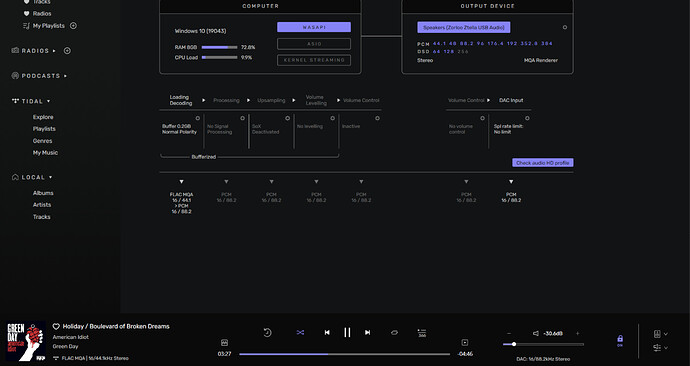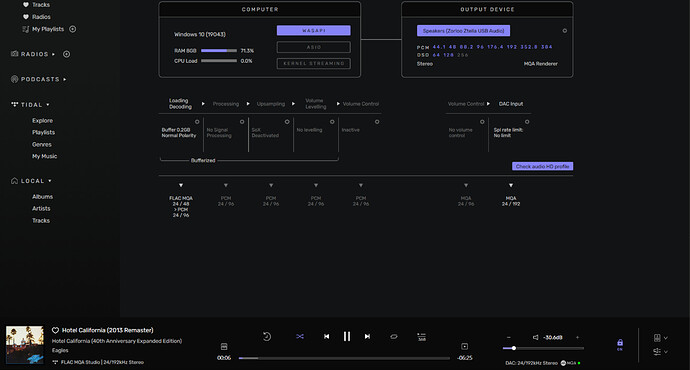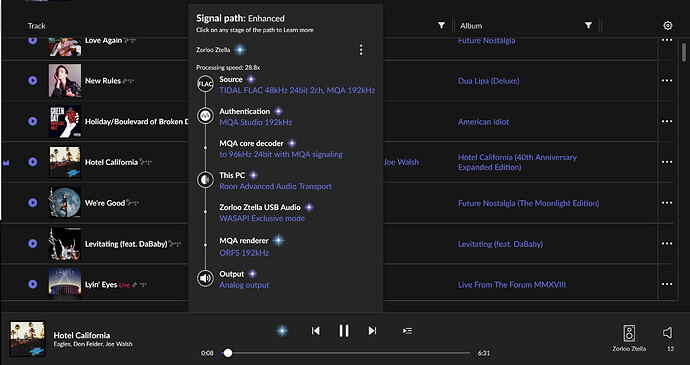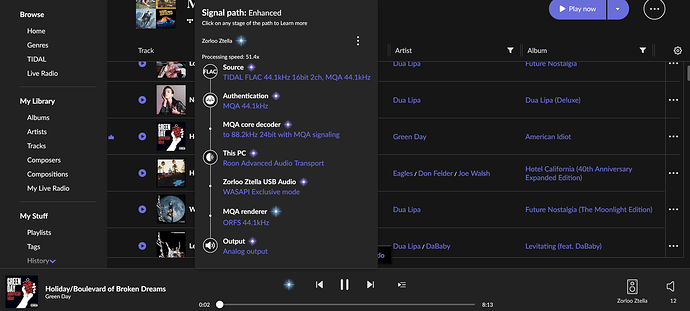Current version: 1.6.1 (10601)
SIGNAL PROCESSING:
Polarity Inversion:
Globally: OFF
Per track: ON
Effects plugins NOT ACTIVE
UPSAMPLING:
SoX not in use
SoX filter parameters
Bandwidth at 0dB = 99.5%
Filter max length = 30000
Anti-aliasing = 100
Phase = 66%
AUDIO VOLUME:
Max allowed volume: 100
Replay Gain: None
SW volume control: OFF
LIBRARY SETTINGS:
Sync list: 0 folders
Library database path: C:\Users****\AppData\Local\Audirvana\Audirvana\AudirvanaDatabase.sqlite
Remote Control server:
Listening on 192.168.0.103 on port 63150
ACTIVE STREAMING SERVICES
TIDAL: Connected as HIFI
=================== AUDIO DEVICE ========================
Max. memory for audio buffers: 1836MB
Local Audio Engine: WASAPI
Preferred device:
Speakers (Zorloo Ztella USB Audio)
Model UID:MMDEVAPI\AudioEndpoints
UID:\?\SWD#MMDEVAPI#{0.0.0.00000000}.{0e133331-6894-42fc-9bf4-65810df430fa}#{e6327cad-dcec-4949-ae8a-991e976a79d2}
Currently playing in Integer Mode:
Device: 2ch 16bits Integer, 4 bytes per frame 88.2kHz
Active Sample Rate: 88.2kHz
Bridge settings:
Sample rate limitation: none
Sample rate switching latency: none
Limit bitdepth to 24bit: OFF
Mute during sample rate change: OFF
Selected device:
Local audio device
Speakers (Zorloo Ztella USB Audio)
Manufacturer: Microsoft
Model Name: Speakers (Zorloo Ztella USB Audio)
Model UID: MMDEVAPI\AudioEndpoints
UID: \?\SWD#MMDEVAPI#{0.0.0.00000000}.{0e133331-6894-42fc-9bf4-65810df430fa}#{e6327cad-dcec-4949-ae8a-991e976a79d2}
8 available sample rates up to 384000Hz
44100
48000
88200
96000
176400
192000
352800
384000
Volume Control
Physical: Yes
Virtual: No
MQA capability
Auto-detect MQA devices: Yes
MQA Renderer device
DSD capability: DSD via PCM 1.1
Device audio channels
Preferred stereo channels L:0 R:1
Channel bitmap: Ox3, layout:
Channel 0 mapped to 0
Channel 1 mapped to 1
Audio channels in use
Number of channels: 2
Use as stereo device only: No
Simple stereo device: No
1 output streams:
Number of active channels: 2, in 1 stream(s)
Channel #0 :Stream 0 channel 0
Channel #1 :Stream 0 channel 1
2 ch Integer PCM 16bit little endian 44.1kHz
2 ch Integer PCM 24bit little endian 44.1kHz
2 ch Integer PCM 32bit little endian 44.1kHz
2 ch Integer PCM 16bit little endian 48kHz
2 ch Integer PCM 24bit little endian 48kHz
2 ch Integer PCM 32bit little endian 48kHz
2 ch Integer PCM 16bit little endian 88.2kHz
2 ch Integer PCM 24bit little endian 88.2kHz
2 ch Integer PCM 32bit little endian 88.2kHz
2 ch Integer PCM 16bit little endian 96kHz
2 ch Integer PCM 24bit little endian 96kHz
2 ch Integer PCM 32bit little endian 96kHz
2 ch Integer PCM 16bit little endian 176.4kHz
2 ch Integer PCM 24bit little endian 176.4kHz
2 ch Integer PCM 32bit little endian 176.4kHz
2 ch Integer PCM 16bit little endian 192kHz
2 ch Integer PCM 24bit little endian 192kHz
2 ch Integer PCM 32bit little endian 192kHz
2 ch Integer PCM 16bit little endian 352.8kHz
2 ch Integer PCM 24bit little endian 352.8kHz
2 ch Integer PCM 32bit little endian 352.8kHz
2 ch Integer PCM 16bit little endian 384kHz
2 ch Integer PCM 24bit little endian 384kHz
2 ch Integer PCM 32bit little endian 384kHz
Local devices found : 3
Device #0: Speakers (Zorloo Ztella USB Audio) Manufacturer: Microsoft Model UID: MMDEVAPI\AudioEndpoints UID: \?\SWD#MMDEVAPI#{0.0.0.00000000}.{0e133331-6894-42fc-9bf4-65810df430fa}#{e6327cad-dcec-4949-ae8a-991e976a79d2} Model Name: Speakers (Zorloo Ztella USB Audio)
Device #1: SAMSUNG (Intel(R) Display Audio) Manufacturer: Microsoft Model UID: MMDEVAPI\AudioEndpoints UID: \?\SWD#MMDEVAPI#{0.0.0.00000000}.{2416cbc2-27ba-446e-b9b7-0847f301992f}#{e6327cad-dcec-4949-ae8a-991e976a79d2} Model Name: SAMSUNG (Intel(R) Display Audio)
Device #2: Speakers (Realtek High Definition Audio(SST)) Manufacturer: Microsoft Model UID: MMDEVAPI\AudioEndpoints UID: \?\SWD#MMDEVAPI#{0.0.0.00000000}.{ab6bdb85-ab94-4eee-8fc2-2bd84ee982bc}#{e6327cad-dcec-4949-ae8a-991e976a79d2} Model Name: Speakers (Realtek High Definition Audio(SST))
UPnP devices found : 0




 I got a bit confused as well for a second when you said it is a decoder.
I got a bit confused as well for a second when you said it is a decoder.